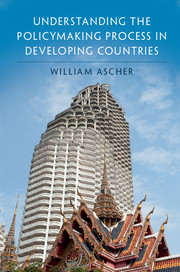Understanding the Policymaking Process in Developing Countries
Understanding the Policymaking Process in Developing Countries provides a uniquely comprehensive and practical framework for development practitioners, policymakers, activists, and students to diagnose and improve policy processes in developing countries across a wide range of issues. Based on the classic policy sciences approach, the book offers over 100 diagnostic indicators keyed to identify problems of policy processes, policy content, bureaucratic behavior, stakeholder behavior, and national-subnational interactions. This multi-disciplinary framework is applied to a host of policy problems that particularly plague countries experiencing the 'under-development syndrome', including aborted programs and projects, policy impasses, distorted implementation, unnecessary harm and conflict, and shortsighted initiatives. These points are illustrated through cases from Africa, Asia, and Latin America. Based on the developing countries' distinctive challenges, the book also offers recommendations on improving policy content and institutions to address the typical limitations.
- Provides clear applications of a powerful policy sciences framework to understand the problems and potential solutions of the policy processes in developing countries
- Proposes a comprehensive set of indicators to diagnose decision-process problems
- Includes many examples from all developing regions, covering a wide range of policy issues
Reviews & endorsements
'This is an excellent book. It is an important step forward in global development scholarship because it combines a highly effective ‘reality check’ on development theory and practice and it offers accessible practical steps and intelligent advice on how to unpack and overcome persistent challenges to development work. It should be required reading for aspirant development practitioners and policymakers.' Craig Hammer, Program Manager, The World Bank
'It is rare to encounter a generalized explanation of the policymaking process in developing countries that doubles as a practical guide for the policy analyst. Understanding the Policymaking Process in Developing Countries is one such contribution. Ascher’s structured and thorough explication of the policy process in developing countries, including the social, political, and institutional dimensions, is especially valuable for the practicing policy scientist.' Matthew Auer, Dean of the School of Public and International Affairs, University of Georgia
'This timely book by an experienced development thinker helps remind us that good development policies and programs require more than careful analysis. Effective policymaking also requires that those charged with implementing policies and programs be willing and able to ask the right questions about how the policy process works. This book provides valuable advice both on how policymakers and their advisors should pose these questions as well as on how they should might get them answered most effectively.' Sudhir Shetty, Chief Economist, East Asia Pacific, The World Bank
Product details
November 2017Hardback
9781108417617
252 pages
236 × 157 × 19 mm
0.48kg
10 tables
Available
Table of Contents
- 1. Challenges to effective development policymaking
- 2. The policy process in developing countries really is different
- 3. The expert's risk: endorsing ill-fated initiatives
- 4. The expert's frustration: rejection of sound knowledge or recommendations
- 5. Overcoming the impasses that block sound initiatives
- 6. Inconsistent or incomplete enactment of initiatives
- 7. Inadequate accommodation for excessive deprivation
- 8. Reducing avoidable conflict
- 9. Minimizing shortsighted policies
- 10. Adapting policy initiatives and institutions
- 11. Conclusions.




